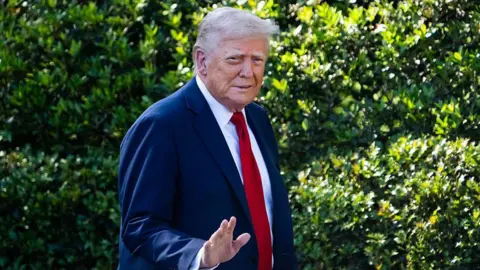Trump set to ease tariff impact on US car makers
 Getty Images
Getty ImagesUS President Donald Trump is set to take action to ease the impact of new tariffs on the auto industry, which had sparked warnings about higher prices and the potential for significant hits to sales and production.
The change will allow carmakers with US factories to reduce the amount they pay in import taxes on foreign parts, using a formula tied to how many cars they sell and the price.
The provision is intended to provide relief to businesses for two years as they rework their supply chains, White House officials said.
They also said that parts made in Canada and Mexico that follow North America free trade rules would not face tariffs, an exemption previously described as temporary.
It comes as Trump is due to hold a rally in Michigan on Tuesday to mark his first 100 days in office.
The state is home to the so-called Detroit Three carmakers - Ford, General Motors (GM) and Stellantis - and a network of more than 1,000 major suppliers to the industry.
Those firms and the wider industry have been plunged into uncertainty since Trump announced new 25% tariffs on cars and car parts in March, saying he wanted to expand domestic car manufacturing - an industry the White House sees as key to national security.
Trump's tariff announcement drove a spike in sales, as consumers rushed to get ahead of the tariffs. But it has also left businesses scrambling to respond.
General Motors, which reported its quarterly performance to investors on Tuesday, said it needed to rework its forecast for the year and pulled its prior guidance.
In an usual move, it also postponed the call that had been set to discuss the results.
Tariffs on foreign-made cars - which accounted for nearly half of US sales last year - went into effect last month.
The duties on parts were expected to come into force on 3 May.
Last week, a coalition of US motor industry groups called on the president to not impose the measures on parts.
A letter to his administration from groups representing companies including GM, Toyota and Volkswagen said the levies would "lead to higher auto prices for consumers, lower sales at dealerships and will make servicing and repairing vehicles both more expensive".
Under the modified plan, carmakers will be able to claim an "offset" for what they pay in tariffs on car parts, worth up to 3.75% of the suggested retail price of the cars they sell.
That share would fall to 2.5% in the second year.
The White House said it meant that a car with 85% of its parts made in the US, Canada or Mexico would not face any tariffs, a threshold that rises to 90% in the second year.
The adjustment is a recognition of the global nature of the industry's current supply networks, where even cars that promote themselves as American-made often source a significant share of their parts from abroad.
The White House said it also intended to shield firms from facing multiple tariffs on the same item, saying the car tariffs would not be added to duties on steel and aluminium.
Ahead of the announcement, General Motors and other carmakers said they welcomed the plans to soften the impact of the measures.
"We're grateful to President Trump for his support of the US automotive industry and the millions of Americans who depend on us," GM chief executive Mary Barra said in an emailed statement.
"We appreciate the productive conversations with the President and his Administration and look forward to continuing to work together."
Ford said it appreciated Trump's decision, which it said would "help mitigate the impact of tariffs on automakers, suppliers and consumers".
"We will continue to work closely with the administration in support of the president's vision for a healthy and growing auto industry in America," a statement added.
The car maker said policies that encouraged exports and ensured affordable supply chains to promote more domestic growth were "essential".
"It will be important for the major vehicle importers to match Ford's commitment to building in America," the company said, adding that if they did, the US would see a "windfall of new assembly and supplier factories and hundreds of thousands of new jobs".
Stellantis chairman John Elkann echoed the sentiments of his rival carmakers in response to the tariff reliefs.
"We look forward to our continued collaboration with the US administration to strengthen a competitive American auto industry and stimulate exports," he added.
